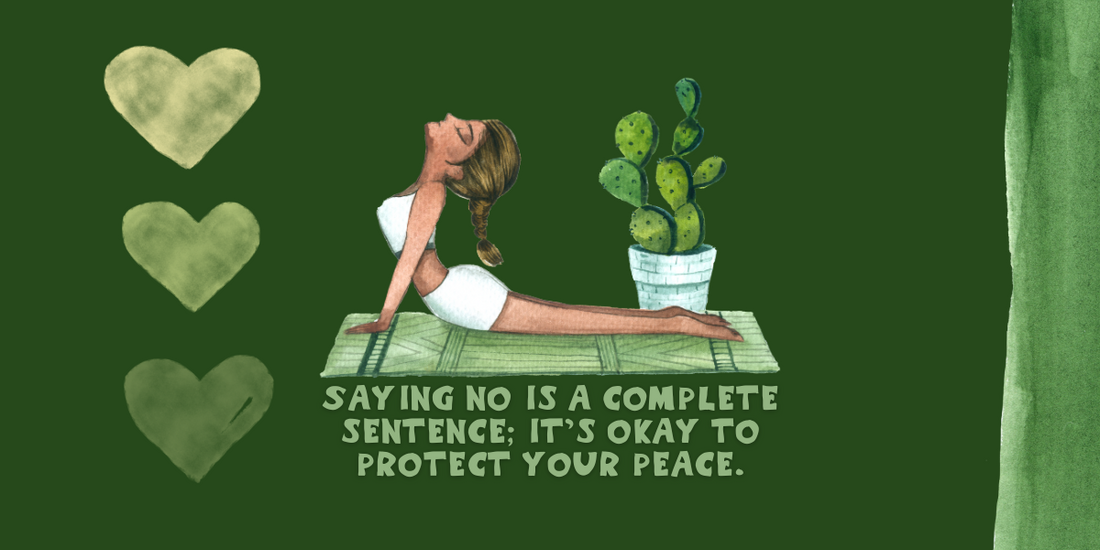
It’s Okay to Say No: Setting Boundaries
Share
Sometimes it feels as if we must take on everything when in reality, it is okay to say no sometimes. Setting boundaries helps us take care of ourselves and they draw a clear line between what is okay for us and what isn’t. When we say “no” and communicate our boundaries effectively, we create a safe space for our wellbeing and mental health. Setting boundaries within our relationships fosters a sense of trust, safety, and respect. It is important for us to value our needs and best interests. We must advocate for ourselves, prioritize self-care, and respect our own limitations.
Saying “No” To Others, and Saying “Yes” to Self-Care
It can be so easy to fall into a pattern of saying “yes” to others, all while saying “no” to what we really need. When we continuously focus on pleasing others, it can lead to negative effects within our personal life. This can be occurring because we feel as though we need approval from others, the fear of being rejected, low self-esteem, etc. It isn’t only about others needs, but your own as well. Katie Reed once stated “Self-care is giving the world the best of you, instead of what’s left of you.” When we continue to focus on the needs of others, and ignore our personal needs, this can lead to burnout. You can quickly get overwhelmed by the demands and expectations of others. It is imperative to maintain a healthy balance in our lives. With that being said, it is okay to say no.
Understanding Boundaries
Boundaries are one of the most important aspects behind a healthy relationship. They allow us to prioritize our time and wellness and protect our energy. There are several different types of boundaries that you should know about and begin to set within your life. They encompass various aspects of life including physical, time, emotional, sexual, intellectual, material, professional, and social boundaries. Establishing clear boundaries helps you communicate your needs, values, and limits to others, while also respecting their autonomy and boundaries. Ultimately, understanding boundaries empowers you to cultivate healthier, more fulfilling connections with others while maintaining a strong sense of self-awareness and self-respect.
Self-Care Is Not Selfish
When we prioritize our needs and make sure we are taken care of, we are able to better care for ourselves and those around us. Self-care is not selfish; selfishness revolves around only caring for our own needs and disregarding others. Neglecting self-care makes us prone to projecting our stress and burnout onto others, while prioritizing self-care ensures that we become better individuals for those around us. Self-care is a necessary investment in one’s own well-being and the well-being of others.
Tips and Strategies for Setting Boundaries
It is very dire for us to define what is truly important to us and create tools in order to protect ourselves and our well-being. Here are a few suggestions and tactics I can offer to help you begin safeguarding your boundaries.
- Set goals and determine what is important for you, your needs, and your well-being. Decide what you can tolerate and what are your non-negotiables.
- Start small. Setting boundaries can be quite difficult and uncomfortable when you first start to put them in place.
- Be clear and specific. Focus on what you want and try to be as clear and specific as possible.
- Practice beforehand. I recommend practicing what you would like to say to someone else in your head or in the mirror. Practice getting comfortable being firm with your needs. At first, it might feel odd, but the more you practice, the more comfortable you will begin to feel.
- Express Your Feelings. Share how their behavior made you feel. We can use “I” statements so that we aren’t placing blame on the other person. For example “I feel upset when people speak over me.”
- Have reasonable consequences for when someone does cross a boundary. For example, if you have already told your coworkers that you do not want to discuss personal matters at work, but they persist, you can kindly let them know “If you do this again, I will need to limit our interactions to work-related discussions only.”
- Open communication. Acknowledge that the individual may not have been aware of your boundary and letting them know you are understanding.
In conclusion, setting boundaries is not only essential for maintaining our well-being but also for fostering healthier and more fulfilling relationships. By clearly defining our limits and communicating them effectively, we empower ourselves to prioritize self-care, protect our emotional and physical health, and cultivate mutual respect in our interactions with others. While setting boundaries may initially feel uncomfortable or challenging, it is a powerful act of self-advocacy and an investment in our overall happiness and fulfillment. Remember that boundary-setting is an ongoing process, and it’s okay to reassess and adjust our boundaries as needed.
WORKS CITED
Imperfect. “7 Types of Boundaries You May Need.” PsychCentral, 2020, psychcentral.com/blog/imperfect/2020/04/7-types-of-boundaries-you-may-need#1)-Physical-Boundaries.
Reid, Sheldon. “Setting Healthy Boundaries in Relationships.” HelpGuide, Accessed 22 April 2024, www.helpguide.org/articles/relationships-communication/setting-healthy-boundaries-in-relationships.htm#.
Verywell Health. “Setting Boundaries.” Verywell Health, Dotdash Meredith, 2022, www.verywellhealth.com/setting-boundaries-5208802. Accessed 22 April 2024.
